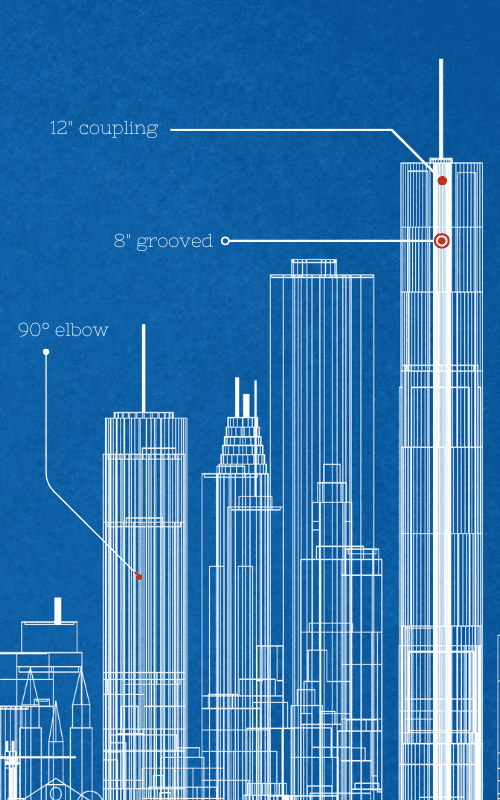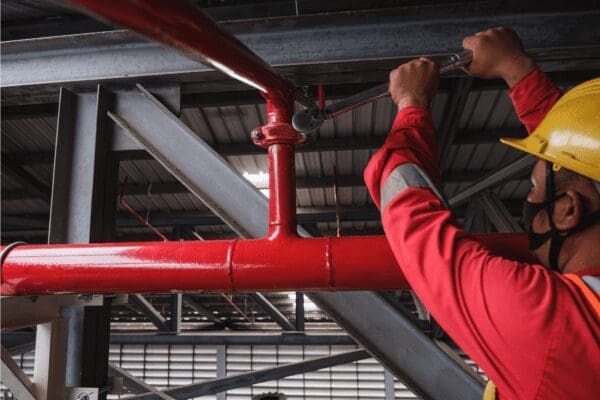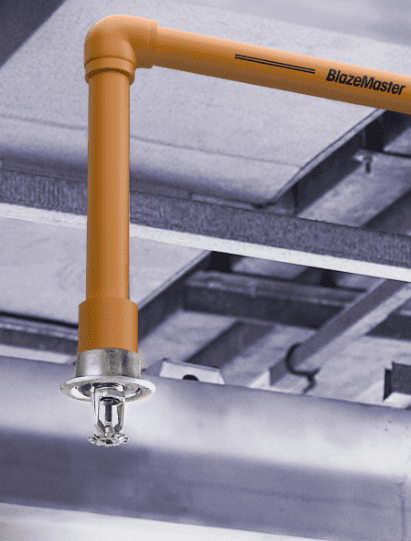West Michigan Construction Institute Impact Report – 2024
west michigan construction institute Impact Report – 2024 Note from the Board Chair Tony Roussey | EV Construction Reflecting on the past year, I am pleased to present our 20
If you’re interested in starting a career in commercial construction you’re probably familiar with Carpentry, Concrete, or Plumbing. But one lesser known option that’s definitely worth exploring is the exciting skilled trade of Sprinkler Fitting.
Not only are sprinkler fitters vital to the success of every commercial construction project, they are craft tradespersons known for having a unique set of skills and operating at the forefront of construction technology.
Sprinkler Fitting is a component of pipe fitting closely related to commercial plumbing construction. It involves the installation and maintenance of life-saving fire suppression systems.
It’s a unique profession among the craft trades as it’s specifically designed to save lives and protect property. For this reason it has it’s own set of codes and regulations and is frequently at the forefront of incorporating new construction technology and equipment.
In this blog, we will walk you through what sprinkler fitting entails, the tools and technology used, the most common projects, and share insight from an expert in the field. We will also help you determine if this is the right career path for you and how to get started.




Sprinkler Fitters that are hardworking, committed to improvement and have mechanical aptitudes, are known to advance very quickly in their careers – some even reaching the level in foreman in under 10 years!
While entry level wages vary depending on location & employer, a Michigan journeyman will typically earns up to $40/hour with attractive benefits like healthcare, ongoing training and retirement savings. Once a person moves into a foreman/supervisor role managing multiple and/or complex projects they commonly make over 6 figure salaries.
Recent Sprinkler Fitting Projects in Michigan
Tools of the Trade
Sprinkler fitters use a variety of specialized tools and equipment, including pipe cutters, threading machines, welding equipment, and testing equipment. They also use hand tools such as wrenches, pliers, and hammers to install and maintain sprinkler systems.


John Norton is an experienced leader & inspector at Total Fire Protection and WMCI’s Sprinkler Fitting II instructor.
You could say I was born into the trades. I’ve been doing it 36 years full time, but was first introduced to it at 8 years old threading pipe in a pole barn for my dad’s company.
My dad started his fire protection company back in 1975. So I grew up working for him in the summer time. I also learned how to do drawings and design at a young age because we didn’t have computers back then.




What I like is that this industry evolves quickly. When I started in the trades there wasn’t such a thing as plastic pipe. Now, we use something called Blaze Master Pipe which is exclusive to fire protection as well as the installation of fully automated systems that can monitor a fire and then automatically shut itself off when its finished.
This technological progression make things less expensive, stronger, and faster which in turn allows us to build better better systems to protect people.
“Learn as much as you can early and quickly. Sprinkler Fitting is like the tech industry in that it evolves rapidly. As I look back, if I could have picked up a more diverse understanding of the trades, I would have moved up so much faster.”
If you are interested in starting a career in commercial construction, sprinkler fitting is a great option. Not only is it well-paid and interesting, it’s a very rewarding profession. It’s not often that you have the opportunity to work in a field that plays such a crucial role in protecting people and property.
The West Michigan Construction Institute currently offers a great path for people of ALL walks of life to develop the skills needed to be a successful sprinkler fitter. In addition to the Sprinkler Fitting I introductory training, WMCI also offers NCCER certified Sprinkler Fitting II and Sprinkler Fitting III courses so you can continue to expand your expertise in the field. Each course is taught by expert instructors from Total Fire Protection and Brigade Fire Protection.
Learn more below or feel free to connect with us directly for more information.
More from the blog:
west michigan construction institute Impact Report – 2024 Note from the Board Chair Tony Roussey | EV Construction Reflecting on the past year, I am pleased to present our 20
A Year in Review Looking back at WMCI’s craft trade training progress in 2023 and ahead to the plans for growth in 2024. “As I think about who and what WMCI is, I am proud
Meet Kyle Jelens - WMCI's High School Instructor & Program Manager. Learn about his path to becoming a teacher of construction, his goals for West Michigan Construction Institute h